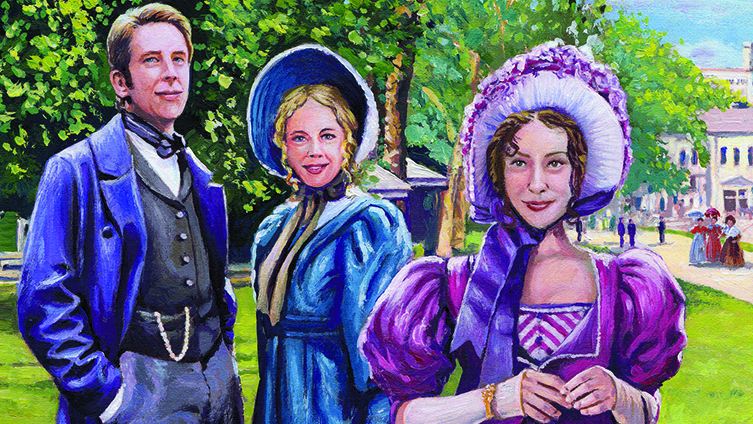On Distant Shores – Episode 04

On Distant Shores
« Previous Post- 2. On Distant Shores – Episode 01
- 3. On Distant Shores – Episode 02
- 4. On Distant Shores – Episode 03
- 5. On Distant Shores – Episode 04
- 6. On Distant Shores – Episode 05
- 7. On Distant Shores – Episode 06
- 8. On Distant Shores – Episode 07
Caber helped Isabel from the carriage and she swept into the house on Charles Street she’d always called her home. The marble-tiled foyer was quiet, although Isabel heard a faint rustling from her father’s study. She peeked past the half-opened door to see her father frowning down at a pile of papers.
Isabel watched him, noticing the worry lines drawn deeply from nose to mouth. She knew the Panic last year had affected her father’s business interests, as it had any of the businessmen involved in speculation. More than one of Boston’s well-to-do families had suddenly found themselves in desperate straits, selling the family furniture and hiring their children out as governesses or tutors – or worse, living in pitiful indignity on the charity of relatives.
Isabel had not given more than a flicker of thought for her family’s circumstances, she realised guiltily. The house on Charles Street was her only home, and as much as its comforting confines sometimes seemed like a prison, she could not imagine living anywhere else, or in more reduced circumstances.
Now, however, she wondered just how badly her father’s business interests had been affected. Her father sighed and glanced up, catching sight of Isabel. He frowned slightly before his face softened into a smile, and he beckoned her in.
“How were your pupils today, my dear?”
Isabel stepped into the private sanctum of her father’s study, inhaling the comforting scents of pipe tobacco and polished leather.
“As ever, I suppose, Father.”
“You’re well?” A little crease had appeared between her father’s heavy brows, and Isabel knew he was worried about her, just as her mother was. Neither of them liked seeing her unhappy or restless. She was usually better at hiding it.
Now she dropped a quick kiss on her father’s forehead.
“Of course, Father. A bit fatigued, perhaps, but nothing that cannot be repaired with a night’s sleep.”
“You must rest before dinner, then. I don’t want you becoming ill, Isabel.”
“No, indeed.” Smiling, she slipped from the room and headed upstairs, determined to cast off the gloom that had briefly enshrouded her in the quiet solitude of the school.
Once in her bedroom, she tossed her reticule on her bureau, only to have the pamphlet from Father Taylor flutter to the floor. Isabel stooped to pick it up, glancing at it thoughtfully. She could hardly imagine being gone from this country for over 30 years, as Adoniram Judson had, or living in such a distant, foreign place as Burma. What adventures had he experienced? What tales might he tell?
She placed the pamphlet on her bureau, determined to ask her sister-in-law Margaret to accompany her to the lecture on Friday.
* * * *
“Things are bad.” Henry Moore’s mouth tightened as if he would deny the words he’d just spoken, although he’d always maintained a modern honesty with his wife Margaret.
Margaret sat across from him in the drawing-room, a porcelain teacup suspended halfway to her lips. Her eyebrows rose, her dark eyes bright with questions.
“They’re bad for everyone.” She smiled, and Henry felt a rush of admiration for the woman he’d married 15 years ago.
Still only in her thirties, Margaret was as lovely and spirited as the day he’d seen her on a muddy side street in Fort William, back in Scotland. She’d been furious about her brother’s tutor’s refusal to instruct her as well, and so Henry, a sea captain wintering with his aunt, had taken on her education. Chaperoned by his dear aunt, they’d begun a tender and tentative courtship, until Henry had left for the sea in the spring, and Margaret had promised to wait for his return.
A year later he’d returned for her as he’d promised, and they’d married before settling in Boston. Margaret had always been independent, educated and decisive. She’d taken on many pet charity projects over the years, although since the birth of their daughter Charlotte, now five, she’d spent more time in suitably domestic pursuits.
“I’ve had a thought,” Henry continued. “There’s no hope or trade to be had in this country. Everyone’s frightened, and they should be. It’s been nearly a year since the banks started calling in their loans, and there’s no end in sight. I read in the paper only yesterday that over three hundred banks have closed their doors. All that paper money is the problem.”
Margaret said nothing, waiting for Henry to continue.
“We need to turn elsewhere,” he said, his voice tense, “and I thought I should begin to trade with China.”
“China!” Margaret returned her teacup to its saucer with an inelegant clatter. “Henry, are you serious? You’ve never traded with China before. They don’t accept traded goods, although, of course, there is that terrible opium . . .” She trailed off, her face darkening.













